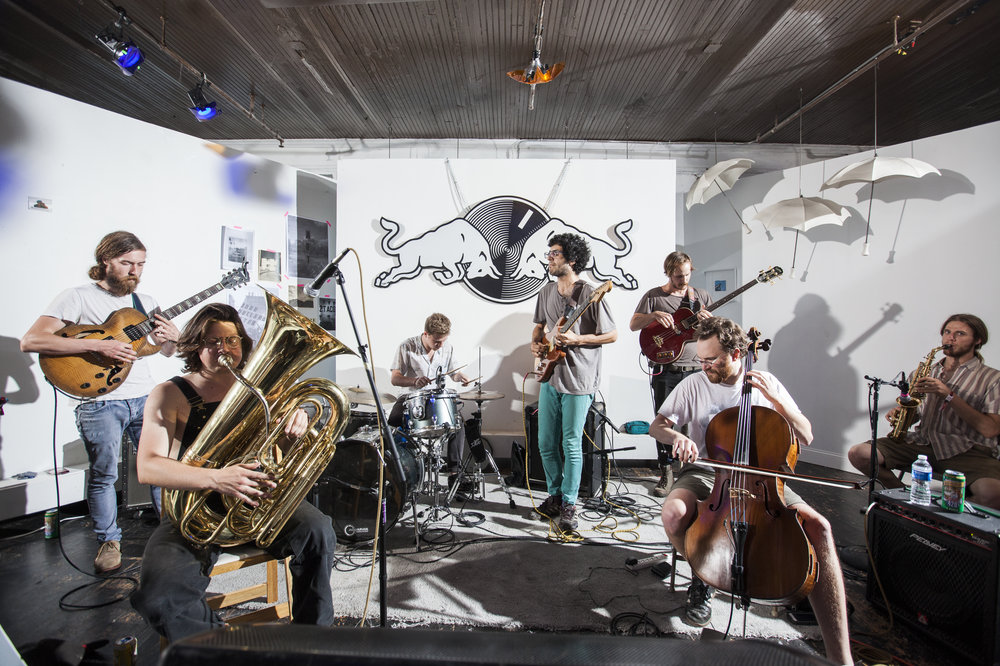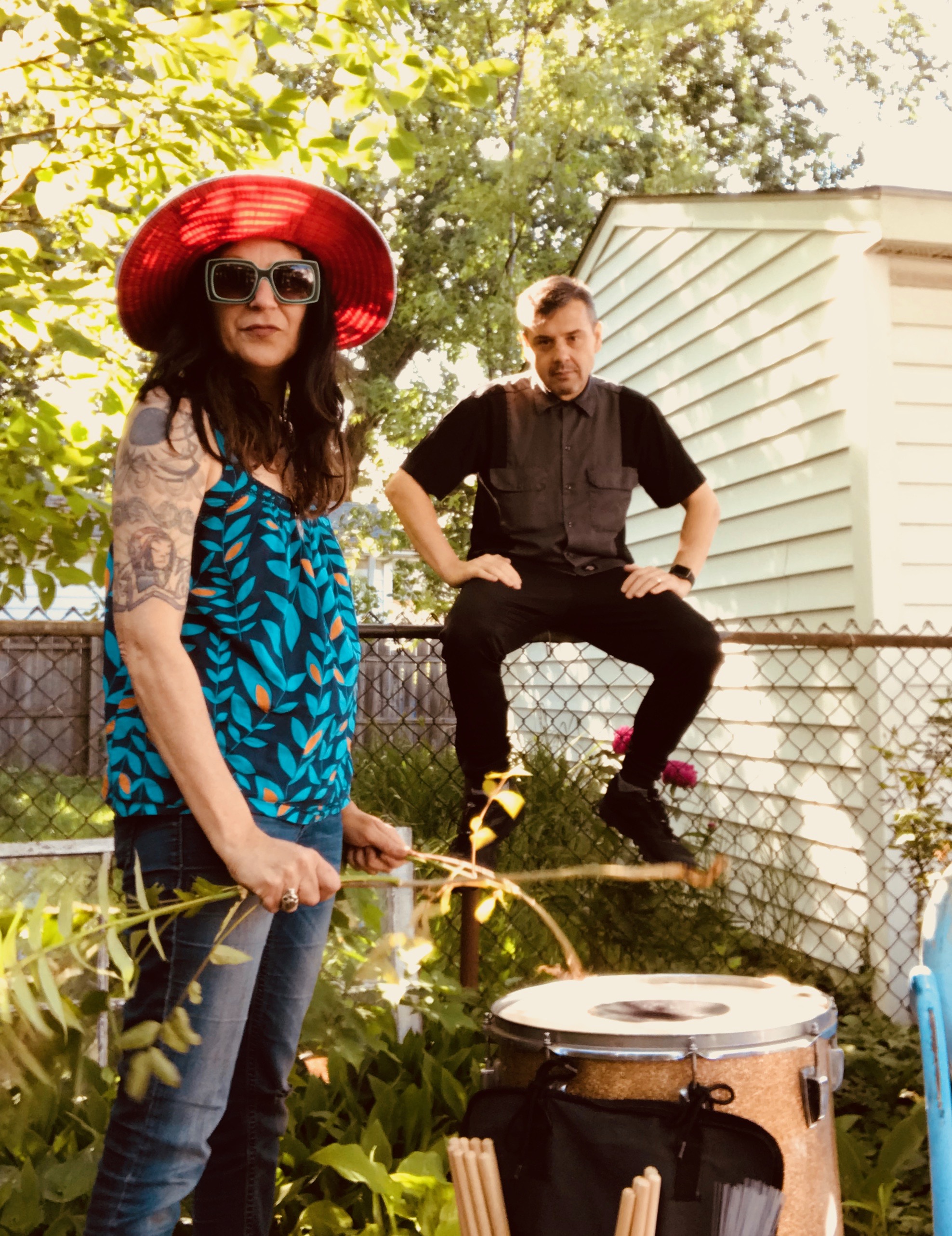by Jarrett Hoffman

Faun and a Pan Flute is a band of cello, alto saxophone, guitar, bass guitar, marimba, percussion, and tuba (Benjamin Shirley, Peter Webb, David Gray, Dan Bailey, Chris Childs, John Gregg, and Julian Hinshaw). They draw on rock, impressionistic jazz, and modern classical music, and over the years have ranged in size from four to twelve members.
Collectively they lead, and collectively they compose.
I recently spoke with John Gregg, the group’s friendly, laid-back percussionist, who had just been watering some of his herbs when he picked up the phone. Gregg grew up in Shaker Heights, and recently lived there again with his wife before moving back to Atlanta. He studied for three years at the School of Music at Georgia State University before leaving to write original music and tour through projects like Faun.
The band’s latest tour brings them to the Midwest — Cleveland, Pittsburgh, Ypsilanti, and Chicago — as well as the East Coast and the Southeast, a schedule which includes nine concerts in ten days. The one free day in that span is currently set aside as TBD / wilderness excursion. “We usually try to build one of those in,” Gregg said, laughing. “It’s always fun. We’ll scope something out in between cities.”
How does the septet get around? “Usually we rent a 15-passenger van and attach a trailer to it, and that takes care of it. In the past, we’ve traveled in an old Frito-Lay truck or a shuttle bus.”
That Frito-Lay truck begged for more questions, but I steered our conversation toward the group’s process of collaborative composition. “Usually it starts off with a very simple idea, and a lot of times ends up being a pretty meaty piece of music,” Gregg said. “Once we’re in the room together, we just expand on it, and it tends to evolve into something different. It takes us a long time to write because we’re pretty meticulous about everything, at least structurally. There’s a lot of talking, a lot of back and forth, and cutting and pasting to put things together and try it out — and if it doesn’t work, we try something else.”
Selections from Faun’s most recent album, titled 2014-2016, will make up about half of their set on Tuesday. The other half? Music that hasn’t yet been released. “We tend to get ahead of ourselves in that way,” Gregg said. “But going on the road and playing shows is a good way for us to exercise the compositions and work them out.”
The band recently connected with Massachusetts-based Feeding Tube Records. “They made some vinyls for us, so we’ll be touring with copies of 2014-2016. We’re pretty excited about that — it’s the newest piece of merchandise that we’ll be carrying around.”

Miss Melvis (guitar and vocals) and John Scully (drum kit, percussion, and electronics) hail from Cleveland’s North Coast Village. They’re each veterans of several of the city’s vintage underground bands, such as The Heathers, Chump, Flat Can Company, Numbskull, Starvation Army, and the SLAP Jazz Quartet.
How do you classify the Duo? They’ve tried out various genre names, but more accurately, they combine analog noise, electronic ambiance, jazz, and punk. In their words, they’re “a post-rock elixir for broken hearts and ruffled minds who exist alone, insufficient, disagreeable and in search.”
However you describe it, their musical identity has come about through a journey — one that hasn’t always been easy. I spoke to the two of them together over speaker phone last week.
John Scully: Mel and I got together in 2014 — she came back to Cleveland, and I had just left another band that she was familiar with. We both come from a punk rock background, and it started with me backing her up. It was low-key.
But I had also gotten heavily involved in jazz, so as time moved on, that influence started becoming apparent. Then I thought I could incorporate the electronic work that I do on the side as well. We’re not the most experimental band in the world, but we want to change the expectations of what a band can do in a duo format.
Miss Melvis: I have this singer-songwriter and rock bent, and we finally found a way to merge.
JS: Mel brings the pop, traditional rock portions of the band, and I bring the experimental, jazz, groove side. We’re evolving as time moves on — and there’s no limit now. We could do any style we want, as long as we can capture it in the moment. And it has to groove.
MM: It has to be honest.
JS: It has to be something that we both like and agree on. Some of the stuff on Slow Wave, the second CD, scared Mel.
MM: The first half of the record, I love — that’s really beautiful stuff. The second half fell in the noise realm, so we pretty much ended up with two records in one.
Sometimes we feel like we confuse the crowd. It’s hard for us to explain what it is that we do. A little of this and a little of that — a little of everything, it seems.
JS: We try to pigeonhole ourselves with some formula of what we sound like, and the closest we can come up with is indie pop.
MM: Or post-rock.
JS: But that’s so vague.
MM: What does it mean? But what does anything mean?
Published on ClevelandClassical.com June 13, 2018.
Click here for a printable copy of this article



